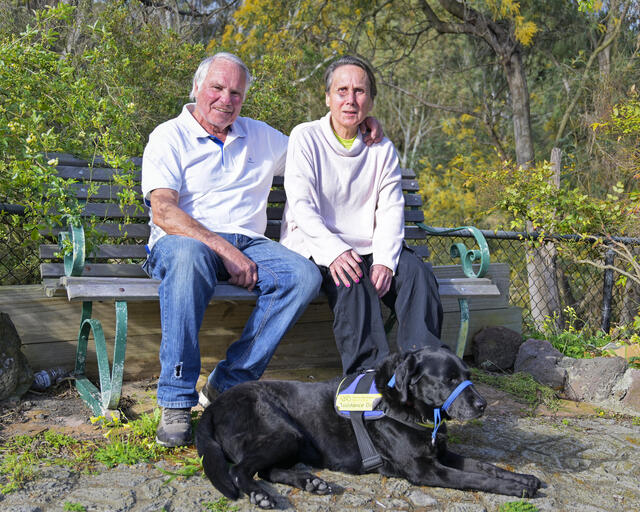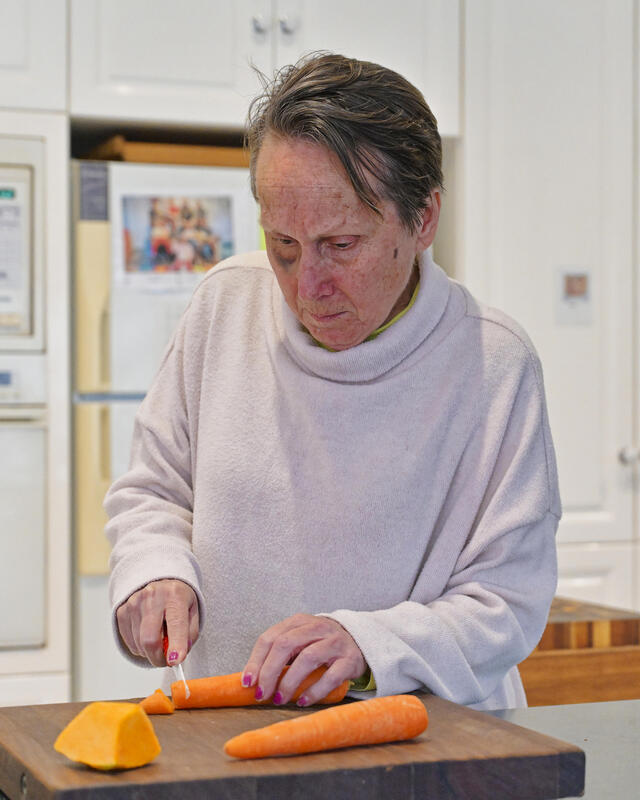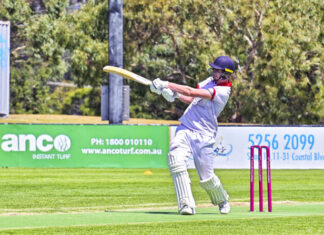Highton’s Joyce Coppi was diagnosed with dementia in 2013. She and her husband Joe spoke with Jena Carr about life before and after the diagnosis during Dementia Action Week.
Highton’s Joe, 78, and Joyce Coppi, 71, refuse to let a dementia diagnosis get in the way of being loving grandparents and active travellers.
Joe arrived in Australia on December 18, 1949, with his family when he was three years old before meeting the woman he was destined to grow old with in his twenties.
“My family spent a couple of years in refugee camps as displaced people. I was born in 1946 in the northern part of Italy, which then was Yugoslavia and now it’s Croatia,” he said.
“We went to various camps for a while until Dad worked out where to go. He wanted to go to Argentina in South America, but then there was a mix-up, and he decided on Australia.
“(Years later) I was working for a national cash register in Melbourne, and one of the guys at work had a couple of friends who were going to have a beer down at the Whitehorse Inn in Hawthorn.
“I met Joyce there and rang her up roughly a week or so later. We went out, and then in 1975 we got married and went overseas, for a long-extended honeymoon of three years.”
Joe and Joyce were drawn to each other through their shared interests in sports and travel; a passion passed down to their three girls.
“I was pretty involved in sports. I was a rower, I rowed for years, and Joyce was a swimmer, and we had that communal understanding of sports and things,” he said.
“We ordered a van, drove around Europe, and worked in England. Joyce was a chambermaid, and I was a dishwasher and a garbo, as in those times, that’s what you did.
“When our first daughter was due, we decided to come back home to Australia in 1978.”
While the couple were overseas for the 100th edition of the Tour de France in 2013, Joe noticed that there seemed to be a delay for Joyce in what was going on.
“We were at the time looking to downsize. We used to live at Ringwood East, and as soon as we got back, I went to see our GP and he said just bring Joyce in,” he said.
“He gave her the full tests and went to Eastern Health, then referred them to a neurologist in Flemington with the diagnosis.
“Joyce accepted that she got diagnosed with dementia, and I asked her if she still wanted to move, and she said yes, so it was her decision.
“When she got diagnosed and we moved down here (Geelong), she accepted it and said, ‘I’m not driving anymore’. It’s not an old person issue, it’s going down to younger people.”
The couple now live in Highton with Joyce’s assistance dog Venus, who she describes as “a very good dog” who loves to shower people with licks when she’s not on duty.
“She’s been very helpful with Joyce through her affection. In the beginning, they used to go shopping together, and all the workers knew Joyce,” Joe said.
“There’s a lot more awareness than when we first started. One of the big things when we ended up getting Venus was the awareness of the dog and the relationship that an animal has with people.
“Joyce doesn’t go around saying I’ve got dementia, but having Venus there creates the awareness for people that Joyce may need a bit of help and then they talk to her and talk to the dog.”
Dementia Action Week takes place from September 16 to 22 to raise awareness for people living with dementia.
It is estimated that close to 5200 people live with different types of dementia in Greater Geelong during 2024, with numbers expected to increase to 10,221 by 2054, according to Dementia Australia.
“One, two, three, four, five, five, six,” Joyce mutters while cutting carrots for a roast, cooking being another activity she and Joe enjoy doing together.
Joe said it was important for anyone living with dementia to continue participating in their interests and to keep active as long as they can.
“In the beginning I said that it’s not going to affect us, we’re just going to do the best we can. Since then, we’ve been overseas again,” he said.
“We also got a caravan, which was just sold, but we did the Flinders Range, Byron Bay, and we’ve made trips to Port Macdonnell and all the shore places.
“We just kept on going until the last year and a half. Joyce’s balance is gone, so I thought the caravan was a bit too much and got rid of it.
“But we’ve been booking cabins now, and we’re off to the Grampians in two weeks’ time. So, if you stop, it’s going to get worse.
“We kept that activity up as much as possible, and that goes for anybody. What I suggest is that you don’t stop. You try and do the best you can for as long as you can.
“Whoever the carer is, like me, the key thing is that you got to look after yourself because if you can’t look after yourself, you can’t look after them and that’s really key.”
Dementia Australia released a new research report, ‘People in the community are the challenge and the solution: Towards a dementia-friendly future’, on September 16.
The report found that 76 per cent of people felt that their family member or friend living with dementia was treated by others as though they weren’t smart.
Dementia Australia chief executive Professor Tanya Buchanan said stigma and discrimination associated with a dementia diagnosis could discourage people from seeking health care.
“It is profoundly concerning that more people now think dementia is a normal part of ageing than they did a decade ago. Dementia is not a normal part of ageing,” she said.
“Dementia Australia is calling for urgent and sustained action by communities and governments at all levels to increase awareness and understanding of dementia, and to become the solution.”
If this story has prompted any questions or concerns, call the 24/7 National Dementia Helpline on 1800 100 500 or visit dementia.org.au










